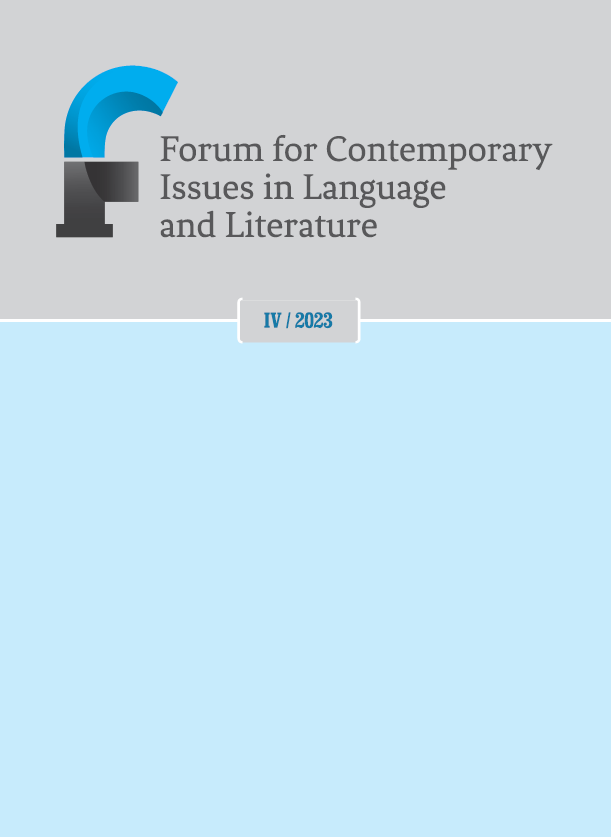REALITY AND REPRESENTATION: THE NONFICTION WRITING IN JOHN UPDIKE'S "MOROCCO
DOI:
https://doi.org/10.34739/fci.2023.04.05Keywords:
Historical appropriation, Travel narrative, Automobile image, Cold War narrative, Emotional dynamicsAbstract
“Morocco” is one of John Updike’s short stories concerning family travel s. With the attempt to blur the gap between fiction and nonfiction, Updike experiments in “Morocco” with a new form of represented reality, which reveals a middle ground between the discourse and the depicted world. Through the portrayal of real historical events by juxtaposing the overt family travel narrative and the covert Cold War narrative, the short story mixes realistic travel writing into a fictional representation of Cold War writing. The Cold War writing, especially when represented through a backdrop of baseless fears, forms the covert narrative dynamics and integrates the narrative rupture in the whole overt family travel story where the unreliable narrative techniques in the tale, such as denarration, and disnarration, break upthe narrative progression and present various possibilities from the fissured narration. It turns out that the various overt narrative possibilities are restricted by the covert Cold War narrative, thus, the variety of overt narratives in “Morocco” is always constrained by the Cold War ideology. While the travel narrative is at variance with this particular reality, the underlying Cold War ideology, nevertheless, serves as the universal representation.
Downloads
References
Andrew, Christopher and Vasili Mitrokhin. 2006. The World Was Going Our Way: The KGB and the Battle for the Third World. New York: Basic Books.
Africanus, Leo. Robert Brown trans. 2010. The History and Description of Africa and of the Notable Things Therein Contained. Cambridge: Cambridge UP.
Bhabha, Homi K. 1994. The Location of Culture. London: Routledge.
Booth, Wayne. 1983. The Rhetoric of Fiction (Second Edition). Chicago and London: The University of Chicago Press.
Brooks, Peter. 1984. Reading for the Plot: Design and Intention in Narrative. New York: Knopf.
Canetti, Elias. 2012 [1968]. The Voices of Marrakesh: A Record of a Visit. London: Penguin Classics.
Cronin, Gloria L. and Ben Siegel, eds. 1994. Conversations with Saul Bellow. Jackson: UP of Mississippi.
Dahan, P. & Lausberg, S. (eds), 2010. Le Maroc et l’Europe: Six Siecles dans le Regard de l’Autre. Brussels: Somogy.
Dapper, Olfert. 1668. Naukeurige beschrijvinge der Afrikaensche gewesten (Description of Africa ). British Museum.
Hegel, G.W.F. 1977. The Phenomenology of Spirit. Trans. A.V. Miller. Oxford: Oxford UP.
Herodotus. A. D. Godley trans and ed. 1920. The Histories. Cambridge: Harvard UP.
Klinkowitz, Jerome. 1980. The Practice of Fiction in America: Writers from Hawthorne to the Present. Ames: The Iowa State UP.
Kramer, Mark. 2016. “Foreword.” in Radoslav A. Yordanov. The Soviet Union and the Horn of Africa during the Cold War: Between Ideology and Pragmatism. New York and London: Lexington Books.
Leerssen, Joep. 2007. “Arabs.” Manfred Beller and Joep Leerssen eds. Imagology: the Cultural Construction and Literary Representations of National Characters. Amsterdam, New York: Rodopi A. V. pp.94-95.
Levinas, Emmanuel. 1998. Entre Nous: Thinking-of-the-Other. New York: Columbia University Press.
Miller, Susan Wilson. 2013. A History of Modern Morocco. New York: Cambridge UP.
Minca, Claudio and Lauren Wagner. 2016. Moroccan Dreams: Oriental Myth, Colonial Legacy. London & New York: I. B. Tauris.
Phelan, James. 1987. Reading People, Reading Plots: Character, Progression, and the Interpretation of Narrative. Chicago: The University of Chicago Press.
Phelan, James. 2007. Experiencing Fiction. Columbus: The Ohio State University Press.
Plath, James, ed. 1994. Conversations with John Updike. Jackson: UP of Mississippi.
Pliny the Elder. John Bostock and Henry T. Riley, trans. 2018. The Natural History. London: Taylor and Francis.
Prince, Gerald. 1992. Narrative as Theme: Studies in French Fiction. Lincoln: University of Nebraska Press.
Ptolemy. J. Lennart Berggren and Alexander Jones, trans. 2002. Ptolemy’s Geography: An Annotated Translation of the Theoretical Chapters. Princeton UP.
Quigley, John. 2012. The Six-Day War and Israeli Self-Defense: Questioning the Legal Basis for Preventive War. Cambridge: Cambridge UP.
Ravi, Srilata. 2003. “Travel and Text.” Asian Journal of Social Science 31(1): 1-4.
Richardson, Brian. 2001. “Denarration in Fiction: Erasing the Narration in Beckett and Others.” Narrative 9(2): 168-175.
Richardson, Brian, ed. 2002. Narrative Dynamics: Essays on Time, Plot, Closure, and Frames. Columbus: The Ohio State UP.
Said,Edward W. 1978. Orientalism. New York: Pantheon Books.
Sartre, Jean-Paul.1989. No Exit and Three Other Plays. New York: Vintage International Publisher.
Schacht, Joseph and C. E. Bosworth eds. 1974. The Legacy of Islam. Oxford: Clarendon Press.
Shemesh, Moshe. 2008. Arab Politics, Palestinian Nationalism and the Six Day War: The Crystallization of Arab Strategy and Nasir's Descent to War, 1957-1967. East Sussex: Sussex Academic Press.
Shen, Dan. 2023. Dual Narrative Dynamics. London and New York: Routledge.
Spivak, Gayatri Chakravorty. 1985. “The Rani of Sirmur: An Essay in Reading the Archives.” History and Theory, Vol. 24, No.3, pp.247-272.
Stern, J. P. 1973. On Realism. London and Boston: Routledge & Kegan Paul.
Toolan, Michael. 2009. Narrative Progression in the Short Story. Philadelphia: John Benjamins.
Updike, John. 1962. Pigeon Feathers and Other Stories. New York: Alfred A. Knopf.
Updike, John. 1971. Rabbit Redux. New York: Alfred A. Knopf.
Updike, John. 2009. “Morocco.” in My Father’s Tears and Other Stories. New York: Alfred A. Knopf.
Westad, Odd Arne. 2005. The Global Cold War: Third World Interventions and the Making of Our Times. Cambridge: Cambridge UP.
Wharton, Edith. 2017[1917]. In Morocco. CreateSpace Independent Publishing Platform.
Downloads
Published
Versions
- 18.03.2024 (3)
- 04.03.2024 (2)
- 27.12.2023 (1)
Issue
Section
License
Copyright (c) 2023 Authors

This work is licensed under a Creative Commons Attribution-NonCommercial-NoDerivatives 4.0 International License.




